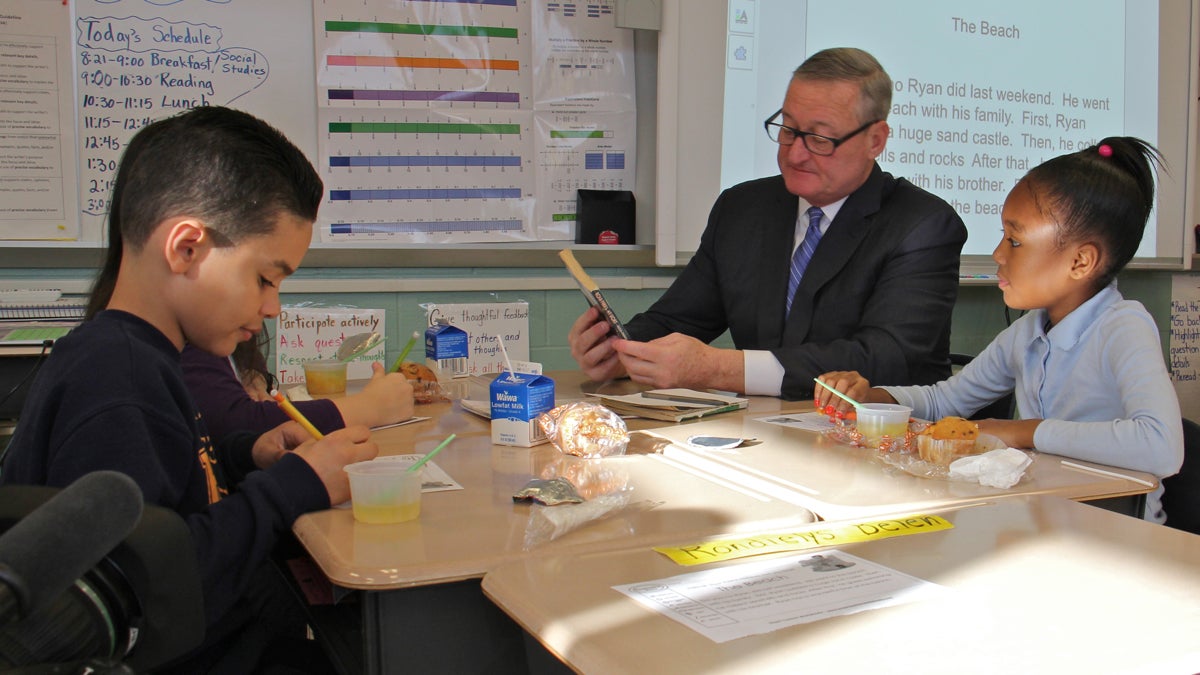Philadelphia’s school district finds creative ways to ensure kids eat breakfast

Philadelphia Mayor Jim Kenney sits down to breakfast with fourth graders at Henry A. Brown Elementary School in Kensington. (Emma Lee/WHYY)
At 6:30 a.m. every school day, a crew consisting of two cafeteria workers and one community volunteer begin the process of cooking and sorting breakfast for each of the 525 students at H.A. Brown School in Philadelphia’s Kensington section.
About two hours later a crate arrives in each of the school’s home rooms stocked with the meal of the morning.
There’s no cafeteria line. And no requirement to arrive early.
As soon as students sit down in the morning they’ve got a worksheet and a bite in front of them.
This “in-class feeding” model, as Principal Connie Carnivale calls it, has made Brown one of 40 public schools in Philadelphia where more than 70 percent of students eat the free breakfast provided by the school district. When Carnivale arrived at Brown five years ago, breakfast was served before the school day began and only about 30 percent of students participated, she said.
“We knew we had to adjust our system,” said Carnivale.
The district wants all of its 220 schools to eclipse the 70-percent threshold for breakfast participation.
“Now that’s a pretty aggressive goal, however, we think we can get to it,” said Wayne Grasela, the district’s senior vice president for food services. “We’re looking for alternative models to provide access to breakfast.”
Rather than relying on students to arrive early for a traditional meal served in a cafeteria, the district is encouraging schools such as Brown to think outside the box. Some set up grab-and-go carts, said Grasela. Others dish out bites in the hallway.
“We’re trying to make what’s happening here at H.A. Brown happen across the district,” said Superintendent William Hite.
At schools such as H.A. Brown–where more than 80 percent of students receive government assistance–the district believes it’s critical students start the day with some sort of meal. And since that’s not a certainty at home, schools can be a crucial safety net.
“It’s the most important meal of the day, particularly for young learners,” said Hite.
The fate of federally funded school breakfast and lunch programs is somewhat uncertain as Republicans take control of Washington.
At present, the so-called Community Eligibility Provision allows poor school districts such as Philadelphia to provide free — or reduced-price meals to all students regardless of their individual family income. Some conservative groups have pushed to eliminate the provision.
There’s also talk of amending nutrition standards for school meals established in the Obama era. Hite said even if the federal government relaxes its standards, Philadelphia won’t walk back its commitment to healthy school meals.
“With all of the other challenges that [our students] face we want to make sure the one guarantee for a nutritional meal is at school,” he said.
WHYY is your source for fact-based, in-depth journalism and information. As a nonprofit organization, we rely on financial support from readers like you. Please give today.





